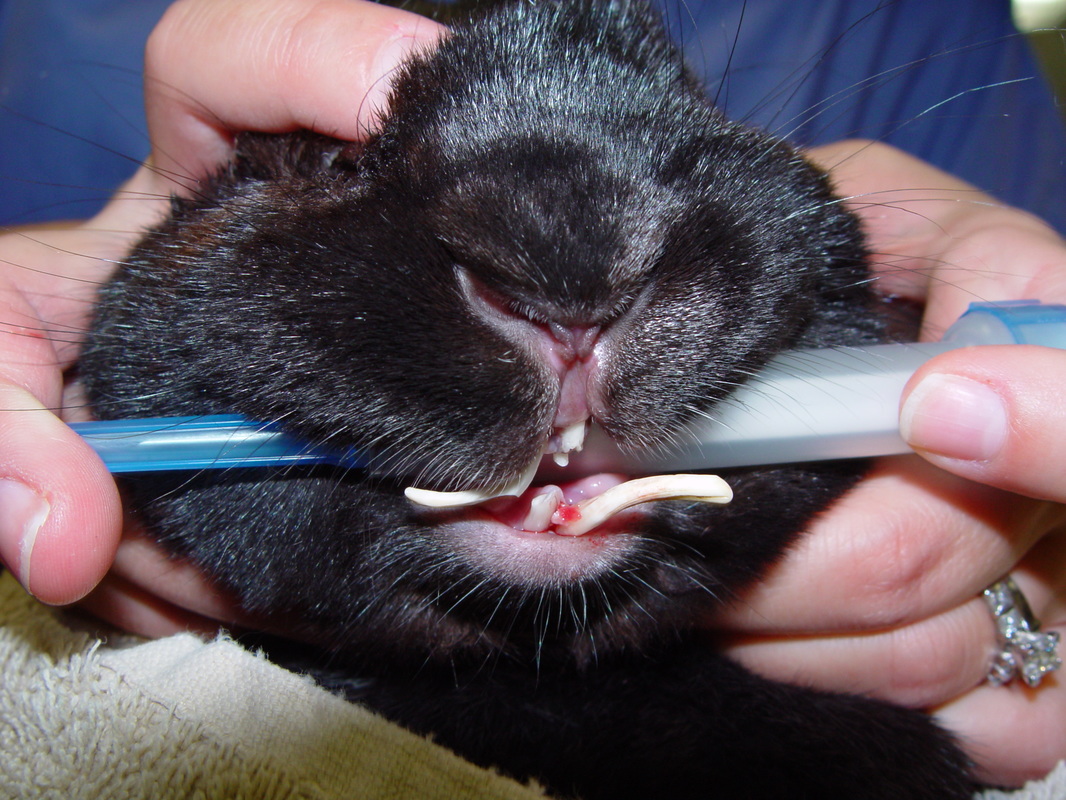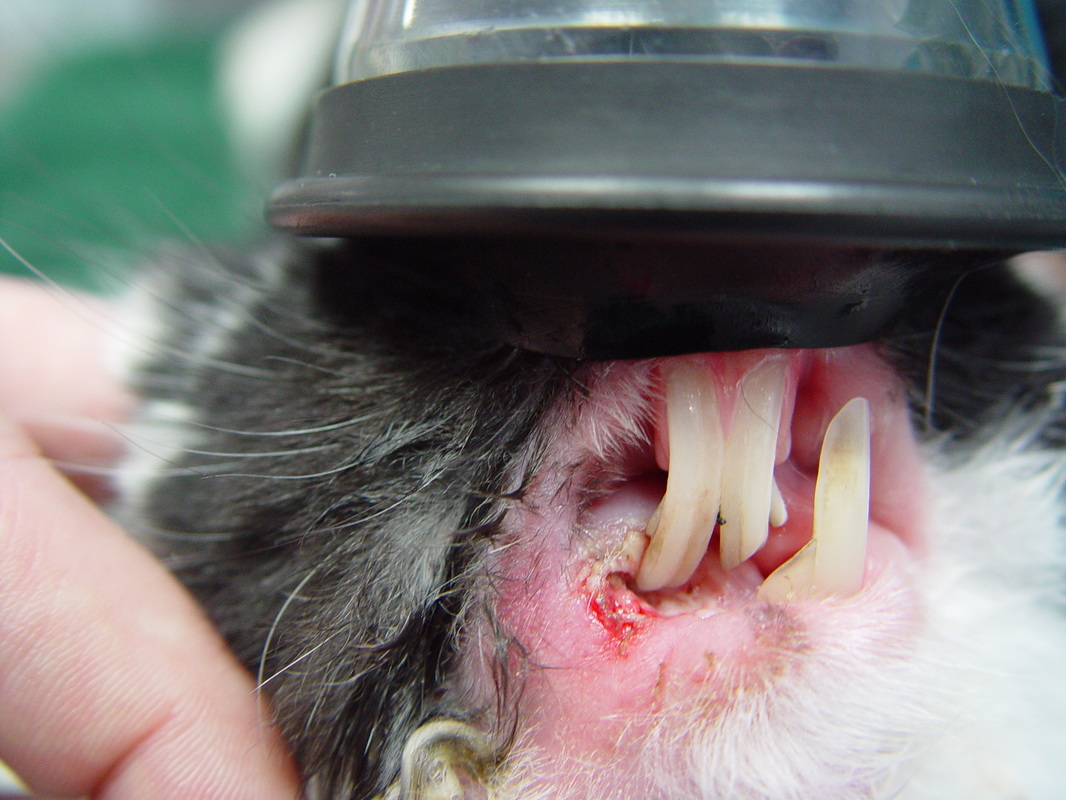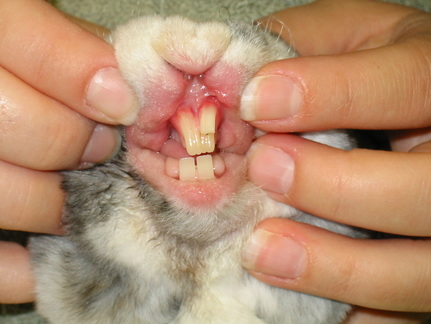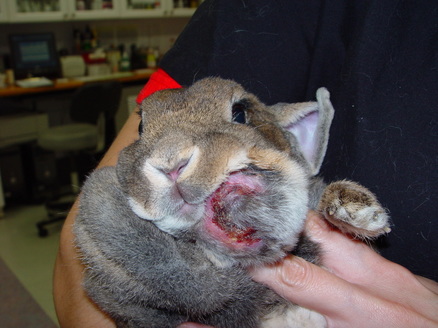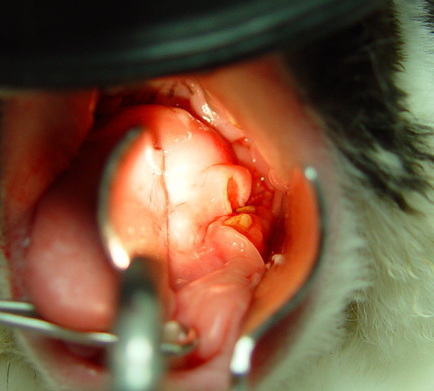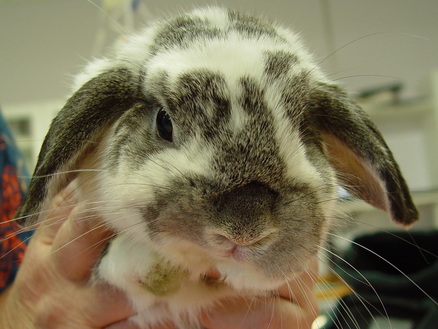Dental Disease
Photos and edited by Susan Horton, DVM
Dental disease in rabbits is a very commonly diagnosed problem and is now recognized as the underlying cause of numerous other disorders. For this reason an understanding of dental health and physiology are crucial for veterinarians that treat rabbits and for rabbit owners alike.
Rabbits are herbivorous, naturally eating a wide variety of vegetation and roughage. A unique feature of rabbits is that all of their teeth are open rooted which means that their teeth grow continually throughout their life. A healthy rabbit eating a proper diet constantly chewing will wear down the teeth as they grow.
Signs of Dental Disease
Signs of dental disease are very broad and may be non specific. Early signs can be subtle and may not be immediately noticeable to the rabbit owner. The rabbit may change its food preferences, stop eating certain things that may be difficult to chew, or drop food from its mouth. The rabbit may have some weight loss or may look unkempt from a change in grooming habits, especially if the incisors are overgrown. Advanced signs of dental disease may be excessive salivation, loss of appetite, malodorous breath, and severe weight loss. Also, the rabbit may present for another problem such as GI stasis, an abscess, or an infected tear duct, all secondary to the primary dental disease.
Incisor Disease
Rabbits are herbivorous, naturally eating a wide variety of vegetation and roughage. A unique feature of rabbits is that all of their teeth are open rooted which means that their teeth grow continually throughout their life. A healthy rabbit eating a proper diet constantly chewing will wear down the teeth as they grow.
Signs of Dental Disease
Signs of dental disease are very broad and may be non specific. Early signs can be subtle and may not be immediately noticeable to the rabbit owner. The rabbit may change its food preferences, stop eating certain things that may be difficult to chew, or drop food from its mouth. The rabbit may have some weight loss or may look unkempt from a change in grooming habits, especially if the incisors are overgrown. Advanced signs of dental disease may be excessive salivation, loss of appetite, malodorous breath, and severe weight loss. Also, the rabbit may present for another problem such as GI stasis, an abscess, or an infected tear duct, all secondary to the primary dental disease.
Incisor Disease
Pictured above are Incisor malocclusions. These are the front teeth that are easy to see in rabbits. There are actually 6 teeth in these pictures. Four incisors and two peg teeth. Malocclusions can happen for many reasons including infection, trauma, and congenital defect. Treatment starts with monthly trimming with a diamond burr and treating any infection associated with the malocclusion. These teeth should not be trimmed with anything else besides the diamond burr. Some rabbits may qualify for incisor removal. Your veterinarian can help you decide which treatment is appropriate.
This rabbit had a traumatic blow to the nose. The upper incisor on the right fractured below the gingiva. The tooth continued to grow until it erupted behind the end of the fractured incisor that was above the gingiva. We removed the vestigial piece of tooth and this bunny went back to normal occlusion.
Causes of dental disease
Dental disease in rabbits is most commonly caused by dietary and genetic factors. Genetic predisposition is very common. With inbreeding, some rabbits are born with incisor malocclusion in which the incisor teeth overgrow and curl around because they do not meet properly. Some rabbits breeds prefer elongated or shortened skulls (depending on the breed type) which also leads to dental occlusion problems. Another common cause is diet. Many rabbits are primarily fed a diet of pellets. Because the pelleted food is dense in nutrient content and is already pulverized, the rabbit chews less. Rabbits’ molars curl as they continually grow. The lower molars develop points that grow into the tongue and the upper molars develop points that grow out into the cheeks because of decreased wear from less chewing. These changes occur gradually with time and can lead to many secondary problems including abrupt loss of appetite and infections. Acquired dental disease with deterioration of the tooth quality, malocclusion and elongation of the roots with abscesses is another form of dental disease in rabbits. Diet, genetics, and metabolic bone disease are all proposed causes for this problem.
Molar Disease
Molar disease is a very serious problem among our pet bunny population. Mildly affected molars may be treated with a straight file as outpatients. For severely overgrown molars or molars with points, a low speed dental drill with a straight dental bur can be used to file down the molars and correctly reshape the teeth. Infections of the molar roots are common in dental disease and often lead to the formation of abscesses and infection in the surrounding bone. If an abscess is present, surgical treatment is required to remove the entire abscess and the capsule. Involved bony tissue should be debrided. There are many therapies we employ depending on the severity of the abscess.
Causes of dental disease
Dental disease in rabbits is most commonly caused by dietary and genetic factors. Genetic predisposition is very common. With inbreeding, some rabbits are born with incisor malocclusion in which the incisor teeth overgrow and curl around because they do not meet properly. Some rabbits breeds prefer elongated or shortened skulls (depending on the breed type) which also leads to dental occlusion problems. Another common cause is diet. Many rabbits are primarily fed a diet of pellets. Because the pelleted food is dense in nutrient content and is already pulverized, the rabbit chews less. Rabbits’ molars curl as they continually grow. The lower molars develop points that grow into the tongue and the upper molars develop points that grow out into the cheeks because of decreased wear from less chewing. These changes occur gradually with time and can lead to many secondary problems including abrupt loss of appetite and infections. Acquired dental disease with deterioration of the tooth quality, malocclusion and elongation of the roots with abscesses is another form of dental disease in rabbits. Diet, genetics, and metabolic bone disease are all proposed causes for this problem.
Molar Disease
Molar disease is a very serious problem among our pet bunny population. Mildly affected molars may be treated with a straight file as outpatients. For severely overgrown molars or molars with points, a low speed dental drill with a straight dental bur can be used to file down the molars and correctly reshape the teeth. Infections of the molar roots are common in dental disease and often lead to the formation of abscesses and infection in the surrounding bone. If an abscess is present, surgical treatment is required to remove the entire abscess and the capsule. Involved bony tissue should be debrided. There are many therapies we employ depending on the severity of the abscess.
Diagnosis
A dental exam should be a part of the annual physical examination. By lifting the lips to check their length and occlusion, the incisors are checked. Also during the exam, the veterinarian will check for the overall body condition, the coat condition, jaw swellings, moisture from the mouth around the chin and neck, and moisture around the eyes, which can all be indications of dental disease. The sides of the cheeks are palpated for any sharp protrusions. We use a lighted nasal speculum to visually evaluate the molars. Occasionally, we can not see points or spurs on the molars well and will recommend a more complete dental exam and filing of the molars under anesthesia based upon our observations.
The dental examination under anesthesia can be performed safely after we determine that your rabbit is a safe anesthetic risk. This may require blood work. The anesthetic agent used is usually isoflourane gas. It is very safe and the rabbit recovers very quickly when this gas is used. We may add analgesics (pain medicine) to decrease the stress of the procedure and improve the rabbit’s recovery. Specialized instruments are utilized to visualize the oral cavity including cheek spreaders, an incisor speculum, and a special light source. Special diamond files, rongeurs, and straight dental burs on a low speed drill are used to remove points and file the teeth down. A system for grading the extent of dental disease based on radiographs has been developed. The extent of dental disease present is graded I through V with V being most severely effected. While under anesthesia, we may take radiographs to evaluate the tooth roots and abscesses.
A dental exam should be a part of the annual physical examination. By lifting the lips to check their length and occlusion, the incisors are checked. Also during the exam, the veterinarian will check for the overall body condition, the coat condition, jaw swellings, moisture from the mouth around the chin and neck, and moisture around the eyes, which can all be indications of dental disease. The sides of the cheeks are palpated for any sharp protrusions. We use a lighted nasal speculum to visually evaluate the molars. Occasionally, we can not see points or spurs on the molars well and will recommend a more complete dental exam and filing of the molars under anesthesia based upon our observations.
The dental examination under anesthesia can be performed safely after we determine that your rabbit is a safe anesthetic risk. This may require blood work. The anesthetic agent used is usually isoflourane gas. It is very safe and the rabbit recovers very quickly when this gas is used. We may add analgesics (pain medicine) to decrease the stress of the procedure and improve the rabbit’s recovery. Specialized instruments are utilized to visualize the oral cavity including cheek spreaders, an incisor speculum, and a special light source. Special diamond files, rongeurs, and straight dental burs on a low speed drill are used to remove points and file the teeth down. A system for grading the extent of dental disease based on radiographs has been developed. The extent of dental disease present is graded I through V with V being most severely effected. While under anesthesia, we may take radiographs to evaluate the tooth roots and abscesses.
Pictured above is a tongue ulcer caused by a draining tooth root abscess at the back of the mouth. This bunny was drooling excessively and had a foul odor from the mouth. All the molars are abnormal in this picture.
Treatment is determined by the extent of the disease. We will present you with the options once a thorough evaluation has been done. The first step is making an appointment. 847-329-8709.
A good link is My Pet's Dentist. For excellent rabbit dental information is presented on this page.
Treatment is determined by the extent of the disease. We will present you with the options once a thorough evaluation has been done. The first step is making an appointment. 847-329-8709.
A good link is My Pet's Dentist. For excellent rabbit dental information is presented on this page.
This bunnies abnormal smile is caused by an ear infection. The nerve that is close to the base of the ear has become inflamed causing the cheek to tighten on one side (picture side left). There is an abscess in the ear canal. This will lead to abnormalities in chewing/eating which will lead to dental problems and cheek problems. So the original problem (the ear abscess) must be treated first to help treat the dental and cheek problems.
